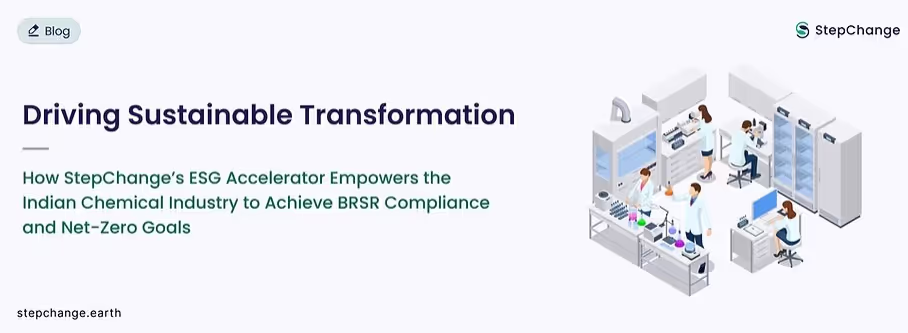
Solutions
Carbon Management
ESG Intelligence
Climate & Nature Risk
Data Registry
Beta
Sector
Get started, schedule a demo or request a free assessment!


The Indian chemical industry, a cornerstone of the nation’s economy, is at a pivotal juncture. As the third-largest emitter of direct CO₂ emissions and a sector under increasing pressure to align with global sustainability standards, companies are grappling with the dual challenge of reducing their environmental footprint while maintaining growth. Enter StepChange’s ESG Accelerator—a cutting-edge platform designed to streamline carbon accounting, enhance ESG compliance, and drive supply chain sustainability. This blog explores how the platform empowers chemical companies to not only meet India’s Business Responsibility and Sustainability Reporting (BRSR) requirements but also transition toward a net-zero future.
1. High Carbon Footprint: The chemical sector accounts for approximately 6% of global CO₂ emissions due to its dependence on hydrocarbons as raw materials and fossil fuels for energy. Scope 1 emissions arise directly from production processes, Scope 2 emissions stem from energy consumption, and Scope 3 emissions originate from supply chain activities.
2. Dependency on Fossil FeedstocksMost chemicals inherently contain carbon atoms derived from fossil feedstocks like oil and natural gas. While electrification and energy efficiency measures can reduce emissions, the sector cannot fully decarbonize without alternative feedstocks such as biomass or recycled plastic waste. The uncertainty around the availability and cost of these alternatives further complicates the transition.
3. Waste Management and Pollution
Improper disposal of chemical waste leads to soil contamination, water pollution, and adverse health impacts. The industry also generates significant plastic waste that contributes to marine pollution. Regulatory frameworks like the European Commission’s mandate for recyclable plastic packaging by 2030 aim to curb these issues
1. Occupational Health and Safety
Chemical manufacturing involves exposure to hazardous substances that pose risks to worker safety. Ensuring compliance with stringent safety protocols is essential but challenging due to the complexity of operations.
2. Diversity and Inclusion
The industry has historically lagged in promoting diversity within its workforce. Companies are now adopting inclusive hiring practices and establishing employee resource groups to support minority groups
3. Community Engagement
Chemical plants often operate near residential areas, leading to community concerns about air quality and water contamination. Companies must balance operational efficiency with social responsibility by investing in local infrastructure or environmental remediation projects.
The chemical industry is under pressure to comply with global ESG reporting standards like GRI, TCFD, and SEBI’s BRSR framework in India. However, fragmented data systems and manual reporting processes hinder accuracy
Governments worldwide are tightening regulations on chemical usage and emissions. Non-compliance can lead to penalties or operational disruptions
Traditional methods like manual data collection and spreadsheet-based reporting are error-prone and inefficient. StepChange’s ESG Accelerator eliminates these bottlenecks with automated, science-driven tools tailored for the sector.
StepChange’s platform simplifies the measurement of Scope 1, 2, and 3 emissions using methodologies compliant with the GHG Protocol. For chemical companies, this means:
The platform’s benchmarking tools allow companies to compare their ESG performance against industry peers and global standards like SBTi. Key features include:
StepChange integrates BRSR’s “principle-wise” disclosures into its workflow:
The chemical industry’s reliance on fossil fuel-derived feedstocks and logistics partners makes supply chain sustainability a priority. StepChange’s Supply Chain Module enables:
As BRSR reporting becomes the norm, chemical companies that adopt platforms like StepChange will lead the transition to a low-carbon economy. By transforming ESG data into actionable strategies, the ESG Accelerator isn’t just a tool—it’s a catalyst for innovation, resilience, and long-term growth.
Ready to redefine your sustainability journey? Explore StepChange’s ESG Accelerator and discover how science-driven analytics can turn your net-zero ambitions into reality.

.svg)